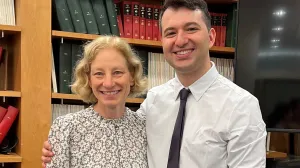
MIRI is delighted that Dr. Elizabeth Yen, a neonatologist at Tufts Medical Center, has joined as PI. Dr. Yen’s lab conducts non-invasive salivary transcriptomic and brain magnetic imaging studies to understand the impact of the prenatal opioid exposure on the developing brain, particularly the areas that govern reward signaling and feeding behavior in neonates suffering from neonatal abstinence syndrome (NAS)/neonatal opioid withdrawal syndrome (NOWS).
Infants born following in utero exposure to opioids suffer from a constellation of withdrawal signs, called Neonatal Abstinence Syndrome (NAS) or Neonatal Opioid Withdrawal Syndrome (NOWS). With a five-fold incidence in the last decade and cost exceeding two billion dollars annually, NAS remains a public health problem that lacks robust biological mechanisms and objective diagnostic measures. Through non-invasive salivary transcriptomic and brain imaging, we begin to understand how opioids dysregulate feeding receptors conveniently located in proximity to the drug receptors, resulting in a hallmark withdrawal sign, i.e., uncoordinated and excessive sucking (hyperphagia), that is distinct across sex. Utilizing these non-invasive platforms, researchers at MIRI aim to develop multifaceted, objective measures to predict withdrawal severity and enable short- and long-term precision medicine for high-risk infants.
Recent research activities:
Grants:
- K12 BIRCWH (Building Interdisciplinary Research Career in Women’s Health) Scholar, "Non-Invasive Evaluation of the Sex-Dependent Impact of Prenatal Opioid Exposure on the Brain Reward Center Regulating Newborn Feeding."
Publications:
- Accepted: Book Chapter, Yen E, Kraft W, Davis JM. Pharmacological Management of Neonatal Abstinence Syndrome, in Neonatal and Pediatric Pharmacology: Therapeutic Principles in Practice, 5th Ed.
- Accepted: Yen E, Murphy HJ, Friedman H, Lucke AM, Rodday A. Neonatal abstinence syndrome practice variations across pediatric subspecialty. J Perinatology, August 2020.

